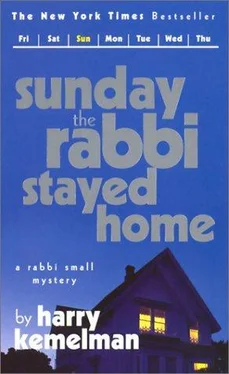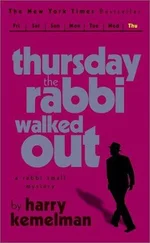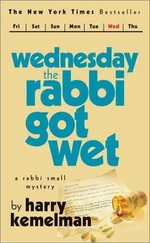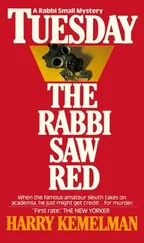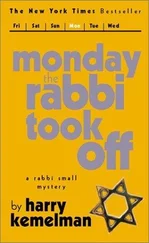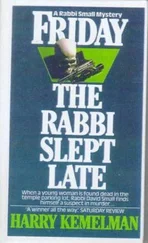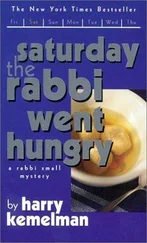Harry Kemelman - Sunday the Rabbi Stayed Home
Здесь есть возможность читать онлайн «Harry Kemelman - Sunday the Rabbi Stayed Home» весь текст электронной книги совершенно бесплатно (целиком полную версию без сокращений). В некоторых случаях можно слушать аудио, скачать через торрент в формате fb2 и присутствует краткое содержание. Город: New York, Год выпуска: 2002, ISBN: 2002, Издательство: iBooks, Жанр: Иронический детектив, на английском языке. Описание произведения, (предисловие) а так же отзывы посетителей доступны на портале библиотеки ЛибКат.
- Название:Sunday the Rabbi Stayed Home
- Автор:
- Издательство:iBooks
- Жанр:
- Год:2002
- Город:New York
- ISBN:978-0743452380
- Рейтинг книги:3 / 5. Голосов: 1
-
Избранное:Добавить в избранное
- Отзывы:
-
Ваша оценка:
- 60
- 1
- 2
- 3
- 4
- 5
Sunday the Rabbi Stayed Home: краткое содержание, описание и аннотация
Предлагаем к чтению аннотацию, описание, краткое содержание или предисловие (зависит от того, что написал сам автор книги «Sunday the Rabbi Stayed Home»). Если вы не нашли необходимую информацию о книге — напишите в комментариях, мы постараемся отыскать её.
Sunday the Rabbi Stayed Home — читать онлайн бесплатно полную книгу (весь текст) целиком
Ниже представлен текст книги, разбитый по страницам. Система сохранения места последней прочитанной страницы, позволяет с удобством читать онлайн бесплатно книгу «Sunday the Rabbi Stayed Home», без необходимости каждый раз заново искать на чём Вы остановились. Поставьте закладку, и сможете в любой момент перейти на страницу, на которой закончили чтение.
Интервал:
Закладка:
“You mean you can get used to it. Sure, but it can also build up. And this could have been the last straw. You can argue these things either way. I should think you’d be happy over the turn of events.”
“Happy? Happy that a young man who has visited in my house however briefly is suspected of murder?”
“Come on. Rabbi. Let’s be practical. Moose Carter was murdered, and that means that somebody murdered him. Now who are the suspects? Well, up till now it has been the kids from your congregation and Meyer Paff, another of your people. I should think that you’d be happy that it’s not them, that it’s not somebody you’re closely associated with, that it’s somebody from out of town, a stranger.”
“Ah, the stranger. Thank God for the stranger.”
The rabbi rose from his chair and began striding back and forth across the room. “We Jews celebrate the Passover in a couple of days. In many respects it’s a most unique holiday, and we celebrate it in a unique way. We begin by cleaning the house of all foods and even all utensils that we use during the year, and during the week of the festival we not only buy special foods, but prepare them in special utensils and eat them from special dishes with special silverware that are used for just that week. Then on the eve of the holiday we have a feast, which is repeated the following night. And in each case the feast is preceded by an elaborate ritual in which the youngest person present asks the meaning of the feast, of the unusual foods that we eat, and the unusual manner of eating them. And then we, the rest of the company, explain how we were slaves in Egypt and were oppressed and how God responded to our suffering by bringing us forth with a mighty hand from our slavery and oppression.”
“Yes, Rabbi. I know the reason for the holiday. But what’s the point?”
“The point is that Passover is not merely a holiday of thanksgiving or rejoicing. We have several such holidays, but this is the only one that has a very elaborate and specific ritual and involves the use of a special set of instructions, the Haggadah, to make sure we follow it exactly right. Why?”
“Tell me.”
“To engrave the lessons it teaches on our minds.” said the rabbi. “It’s a mnemonic, a string around the finger, a way of forcing on our consciousness and memory what people would rather not think of or would easily forget.”
“Once a year the Pope washes and kisses the feet of beggars.” Lanigan said.
“Precisely. And no doubt he profits by the lesson in humility that it teaches him.” said the rabbi primly. Then he added as an afterthought. “It’s a pity it isn’t required of all members of your faith.”
Lanigan laughed. “All right. Rabbi. Now what is it that your holiday teaches?”
“It is associated with a specific commandment that is central in our law: ‘And if a stranger sojourn with thee in your land, ye shall not do him wrong… he shall be as the homeborn among you; for ye were strangers in the land of Egypt.’”
“You saying that I’m being unfair to Jenkins because he’s colored and from out of town?”
“Do you have him in custody, and has he confessed?”
“We haven’t got him yet, Rabbi, but we’ll get him. It’s that motorbike of his—it’s not like a car. You can wheel one of those over the sidewalk into a hallway or even a cellar, and how is it to be found? But I have alerted the New York police, and they’ll find him.”
“But you don’t have any real evidence against him—only what you consider his motive and the opportunity.”
“Oh, we’ve got the evidence, all right,” said Lanigan. “We had it that first night, which is why I let your young people go home. As soon as the youngsters told us what they found and we knew it was murder, I sent some of my men scouring around Hillson House to see what they could pick up. And right off the bat, we got it. There’s a tall, thick hedge in front of the house, and behind it, in the soft earth where it would be hidden from the street, we found a perfect motorbike tire mark.”
Chapter Forty-Seven
The carpenter entered diffidently, awkwardly doffed his old-fashioned, wide-brimmed felt hat, and in response to the rabbi’s invitation, sat down on the edge of the chair. “My wife thought I ought to change,” he said in explanation of the black suit he was wearing, the highly polished black shoes, the white shirt, its collar uncomfortably tight, the wide florid necktie. “Out of respect, you know.”
The rabbi nodded, not because he understood, but as a sign for him to go on.
“Lanigan called me this morning to tell me to come down to make arrangements for the burial. He said they had decided that they didn’t need an autopsy.”
“I see.”
“So after I made the arrangements, I thought I’d stop off and thank you.”
“I did nothing, Mr. Carter. Nothing.”
“Well. I figure if you hadn’t gone down Monday night—”
“No. Mr. Carter.” said the rabbi firmly, “that really had nothing to do with it. Chief Lanigan quite properly refused to release the body then because he had doubts about the cause of death. Quite rightly, as it turned out. When he discovered that the death was by asphyxiation, he consulted with the Medical Examiner, who told him that an autopsy was unnecessary and that they would learn nothing by it. As I understand it, acute alcohol poisoning results in a paralysis of the nerve that controls breathing, so that the effect on the organs is the same as asphyxiation.”
“I still think that if you hadn’t gone down there they might have gone through with it anyway. Doctors have been known to do it, you know, just for practice,” he added darkly.
“You’ve made plans for the funeral?” asked the rabbi to get him off the subject.
Carter nodded. “We’re having a private affair—just the family. We didn’t want a crowd, so it’s just the family and a preacher friend of mine that I worked with on the fluoridation campaign. He’ll say a few words.”
“I think that’s best.”
“You know, Rabbi, I might have saved that boy.” Carter clenched his fists. “I wouldn’t say it to my wife, but I’m telling you.”
“How do you mean?”
“I didn’t listen. Rabbi. The Lord spoke to me, and I didn’t listen.”
The rabbi looked up with interest. “Oh?”
“I went out looking for him that night. I looked downtown and looked in the taverns, because that’s where I thought I might find him. And when he wasn’t there, I just rode around, up one street and down the other, aimless-like. I rode up by Tarlow’s Point. Now why did I go up there if the Lord wasn’t directing me? I even slowed down as I passed Hillson House. Was the Lord directing my footsteps or wasn’t He?” he demanded. “But I was angry with the lad, and it blocked out the voice of the Lord. If I had been receptive, He would have spoken to me and told me where to look. But my mind was blocked, Rabbi, and the voice couldn’t come through.”
“You mustn’t think that way. Mr. Carter.”
“I feel better for having unburdened myself. Rabbi. I had to say it to someone, and I just couldn’t say it to my wife. Oh, I know the Lord moves in mysterious ways, and it’s part of some great plan that’s beyond the capacity of my mind or else it’s punishment on me or maybe even on my wife for sins committed in the past. But I want you to know that my own faith hasn’t wavered—not for a moment. And if my anger blocked out the voice, maybe that was part of the divine plan. too. Or maybe it was to teach me that my anger was a wickedness.”
“Are you suggesting the Lord would take your son’s life just to teach you to control your anger?” asked the rabbi sharply.
Читать дальшеИнтервал:
Закладка:
Похожие книги на «Sunday the Rabbi Stayed Home»
Представляем Вашему вниманию похожие книги на «Sunday the Rabbi Stayed Home» списком для выбора. Мы отобрали схожую по названию и смыслу литературу в надежде предоставить читателям больше вариантов отыскать новые, интересные, ещё непрочитанные произведения.
Обсуждение, отзывы о книге «Sunday the Rabbi Stayed Home» и просто собственные мнения читателей. Оставьте ваши комментарии, напишите, что Вы думаете о произведении, его смысле или главных героях. Укажите что конкретно понравилось, а что нет, и почему Вы так считаете.
